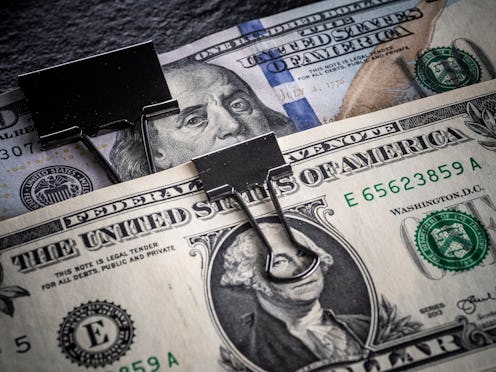
Our society tends to believe that the more money you can save, the better. There's a ton of advice on saving money out there, and while there's a ton on how to spend it as well (aka advertising), spending more than you need to is generally frowned upon. Of course, saving money is a good thing. But just like exercise, sleep, and other things that are good for you, it can be bad for you in excess.
Compulsive saving may be more common than we realize. Financial planner Jason Heath told The Globe and Mail that around a quarter of his clients had an irrational fear of spending money they could afford to spend. Some people develop issues with compulsive saving in order to overcompensate for overspending in the past, David Bakke, a financial expert at Money Crashers, tells Bustle. Others internalized the message to save as much as possible from their parents.
Compulsive saving can also be a symptom of Obsessive Compulsive Personality Disorder. People with this condition, not to be confused with Obsessive Compulsive Disorder, sometimes have "a miserly spending style toward both self and others; money is viewed as something to be hoarded for future catastrophes," according to OCD Hope. Excessive money saving can be considered a form of hoarding as well.
Obviously, saving money is a good thing when you actually need to. But if you find yourself engaged in any of these habits, your saving may reflect underlying issues that require attention.
1You Have To Replace The Things You Buy
Your saving has gone beyond practicality if you're saving a penny to lose a dollar, so to speak, says Bakke. If you're always buying new headphones, for example, because the $5 ones you get keep breaking, you'd be better off just buying the $10 ones — and your motives for sticking to $5 or less may be more deep-seated than you realize.
2You Don't Reward Yourself For Your Saving
Your saving should have an end goal, both in the short term and the long-term, not be a goal in of itself. In the long-term, you should have some idea of why you'll need all this money. And in the short-term, you should feel comfortable rewarding yourself with travel, dinners out, shopping, or other things you like, says Bakke.
3You Stress Over Small Expenses
If you've got more than enough money in the bank but spend several minutes debating whether you want to pay the extra dollar for rice with your Thai food, your concern for spending may be obsessive. "It is great you are mindful of spending, but you shouldn't sweat over the little things," TopCashback's Personal Finance Expert Natasha Rachel Smith tells Bustle.
4Money Prevents You From Socializing
You may pat yourself on the back for staying home instead of spending $20 for drinks out with friends, but it's probably not worth the social opportunities you've missed out on. "If you notice your friends stop asking you to go out because you always say no due to fear of spending, you might want to rethink your decisions," says Smith. "It is OK to cut back but it is also important to enjoy life."
5You Deny Yourself Basic Necessities
Food, toiletries, medicine, doctors' or therapists' appointments, and other things you need to take care of yourself should not be among your personal budget cuts. Even if it means dipping into your emergency fund, you shouldn't even think twice about getting something you really need, says Smith.
6You Buy Things Just Because They're On Sale
Buying something on sale still costs more than not buying anything, so you're not actually saving money by constantly using coupons or shopping at thrift stores. "Shoppers who frequently buy useless items on sale or clearance or spend more to save more are hurting their finances in the long run regardless of how good of a deal they snagged," Consumer-Finance Expert Andrea Woroch tells Bustle.
7You Waste Time Trying To Save Money
The 10 bucks you might save driving from grocery store to grocery store trying to find deals probably won't be worth the half hour you spend. "Consider the best way to use your time and how much it’s costing you to save versus earn money during that time instead," says Woroch.
If you find yourself unable to stop these habits, you may want to talk to a professional about the underlying causes.